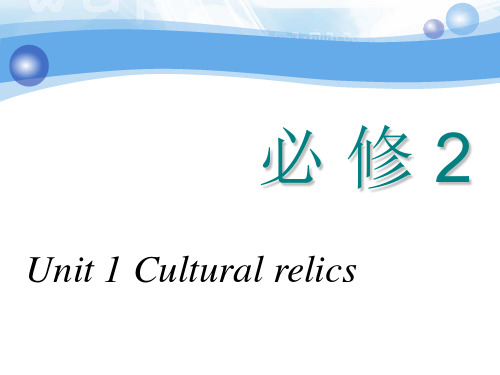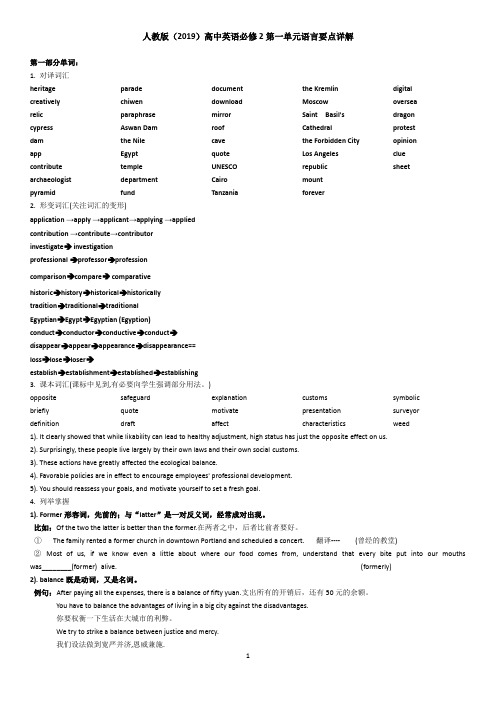高中英语必修二Unit1语法及词汇总结
英语高一必修二unit1知识点总结

英语高一必修二unit1知识点总结英语高一必修二 Unit 1 知识点总结高中英语必修二 Unit 1 主要学习了有关“人与动物”的知识。
在这个单元中,我们学习了动物的分类、特征、保护和与人类的关系等方面的内容。
以下是对该单元的知识点进行总结。
一、动物的分类动物按照不同的特征进行分类,常见的分类方法有脊椎动物和无脊椎动物、冷血动物和温血动物、哺乳动物和非哺乳动物等。
1. 脊椎动物(Vertebrates):具有脊柱的动物。
如鸟类(Birds)、鱼类(Fishes)、哺乳动物(Mammals)等。
2. 无脊椎动物(Invertebrates):没有脊柱的动物。
如昆虫(Insects)、软体动物(Mollusks)、节肢动物(Arthropods)等。
二、动物的特征不同的动物在外貌、生理特征等方面存在着差异。
以下是一些动物特征的总结:1. 鸟类的特征:具有羽毛和嘴,可以飞行。
2. 哺乳动物的特征:具有乳腺,能够哺乳喂养幼崽。
3. 爬行动物的特征:行动呈爬行状态,如蛇、龟等。
4. 两栖动物的特征:同时能在水中和陆地上生活,如青蛙等。
5. 鱼类的特征:生活在水中,呼吸通过鳃完成。
三、动物保护动物保护是我们应该关注和重视的问题。
以下是一些动物保护的常见方面:1. 保护野生动物及其栖息地。
2. 防止非法捕猎、盗猎和买卖野生动物及其制品。
3. 提倡保护动物的法律法规。
四、动物与人类的关系人与动物之间存在着密切的联系和相互依赖。
以下是一些动物与人类的关系的例子:1. 动物是人类的食物来源之一,如牛、猪、鸡等。
2. 动物在科学研究和医学领域具有重要意义,如实验动物。
3. 动物提供给人们情感上的陪伴,如宠物。
4. 动物在生态系统中扮演着重要的角色,如传粉媒介和控制害虫等。
结语高中英语必修二 Unit 1 知识点总结了动物的分类、特征、保护和与人类的关系等方面的内容。
通过对这些知识点的学习,我们能够更好地了解动物世界,增强对动物保护的意识,从而更好地与动物共同生活在这个地球上。
高一英语必修二unit1知识点总结

高一英语必修二unit1知识点总结高一英语必修二 Unit 1 知识点总结Unit 1: Cultural relicsIn this unit, we have learned about cultural relics and how they reflect the history, culture, and traditions of a nation. Let's summarize the key points we have covered:1. Introduction to Cultural Relics- Cultural relics are objects of historical, artistic, or scientific interest that hold cultural significance.- They can be categorized into tangible cultural relics (such as sculptures, paintings, and artifacts) and intangible cultural relics (such as traditional customs, performing arts, and rituals).- Cultural relics help us understand the past, preserve cultural heritage, and promote cultural exchange.2. The Importance of Cultural Relics- Cultural relics provide insights into the history, values, and beliefs of a society.- They contribute to the development of national identity and pride.- Cultural relics attract tourists, boost the economy, and promote cultural tourism.3. Protection of Cultural Relics- The preservation and protection of cultural relics are essential to maintain our cultural heritage.- Governments and organizations play a crucial role in safeguarding cultural relics through legislation and conservation efforts.- Individuals can also contribute by raising awareness, participating in restoration projects, and respecting cultural relics.4. Famous Cultural Relics in China- The Great Wall: An iconic symbol of Chinese civilization and a UNESCO World Heritage Site.- The Terracotta Army: Discovered in the mausoleum of Emperor Qin Shi Huang, it represents the military might of ancient China.- The Forbidden City: Located in Beijing, it served as the imperial palace for 24 emperors during the Ming and Qing dynasties.- The Mogao Caves: Situated along the Silk Road, these caves house a collection of Buddhist art and scriptures.5. Cultural Relics Around the World- The Pyramids of Egypt: Constructed as tombs for pharaohs, they showcase ancient Egyptian civilization.- The Acropolis of Athens: A group of historical buildings including the famous Parthenon, representing ancient Greek culture.- Stonehenge: A prehistoric monument in England that raises questions about its purpose and construction.6. Cultural Relics and Tourism- Cultural relics are major tourist attractions, drawing visitors from around the world.- Tourism provides financial support for the preservation and restoration of cultural relics.- It is crucial to balance tourism with the need for conservation to ensure the long-term sustainability of cultural relics.In conclusion, the study of cultural relics offers valuable insights into our shared human history and cultural diversity. By understandingand preserving these relics, we can celebrate our past, embrace our present, and inspire future generations to appreciate and protect our rich cultural heritage.。
高中英语必修二 语言点 Unit 1 Cultural relics

返回
冲关集训·强化落实
Ⅰ.单句语法填空 1.—What do you think of the book?
—Oh, excellent. It is worth reading (read) a second time. 2.Their most valuable (value) belongings were locked in a
(2)debate on/about/over ... debate about sth.with sb.
正在讨论中 举行讨论 一场有关……的辩论 就……辩论 和某人就某事辩论
[多角练透] 单句语法填空
返回
①One of the questions under debate over education in many colleges is whether education is a lifetime study. ②They debated for an hour about/on/over the advantages and disadvantages of the plan.
去除
⑤The doctor asked Mr King to remove his trousers so that he
could give him an examination.
脱去
[归纳拓展]
remove ... from ... remove sb. from one's post remove sb. from school remove one's doubt
safe in the bedroom. 3.Mr. Reed selected (select) to represent us in the meeting
译林高中英语必修二unit1语法

译林高中英语必修二unit1语法1. 情态动词在英语中,情态动词(Modal Verbs)是一类特殊的动词,被用来表达说话人的态度、情绪和能力等。
这些情态动词包括:can, could, may, might, must, shall, should, will, would等。
本单元将重点介绍几个常用的情态动词及其用法。
1.1 Can/CouldCan和Could都用来表示“能够、会、可以”的意思。
例如:•I can swim.(我会游泳)•She could speak three languages when she was 10.(她十岁的时候能说三种语言)Can用来表示一种一般的能力,而Could表示一种过去的能力。
例如:•I can understand this book.(我能理解这本书)•I couldn’t answer the question.(我不能回答这个问题)1.2 May/MightMay和Might都表示“可能”、“可以”的意思。
例如:•It may rain tomorrow.(明天可能会下雨)•He might be busy.(他可能很忙)May比Might更常用,表示更大的可能性。
May还可以表示请求、许可等含义。
例如:•May I go to the bathroom?(我可以去洗手间吗?)•You may use my computer.(你可以用我的电脑)1.3 MustMust表示“必须”、“一定”、“肯定”的意思。
例如:•You must finish your homework.(你必须完成你的作业)•He must be Chinese.(他一定是中国人)Must用于肯定句,表示说话人的判断或推测。
2. 情态动词的否定形式对于情态动词的否定形式,通常在情态动词之后加not。
例如:•I can’t swim.(我不会游泳)•You may not enter.(你不可以进入)在口语中,也可以使用缩略形式,如:can’t, couldn’t, mayn’t, mightn’t等。
外研版高一英语必修二全书知识点总结

高中英语必修2(外研版)Unit 1 Our Body and Healthy Habits知识点总结一、重点词汇四者都可以指“伤害、伤痛”。
他的名字叫汉森,在挪威是一个常见的名字。
As a general rule, prices follow demands.一般而言,物价随需求而变化。
Now electrical appliances have entered into ordinary families.现在,家用电器已经步入普通家庭。
1. a healthy/balanced diet:健康的/均衡的饮食2. go/be on a diet:用规定食谱;节食You don't have to go on a diet to lose weight.你不需要靠节食来减肥。
1. be anxious about sth.:为…担心,忧虑2. be anxious for sth.:渴望…3. be anxious to do sth.:急于,渴望做某事I am anxious about the parcel because it hasn't arrived.我对这包裹很担心,因为它还没到。
The whole country was anxious for peace.全国上下都渴望和平。
She was anxious to finish school and get a job.她渴望毕业找一份工作。
He's still crazy about both his work and his hobbies.他对工作和个人爱好依然保持狂热。
The teacher began his class with a question.老师以一个问题开始他的讲课。
He got injured through his own carelessness.他由于粗心受伤了。
In large cities people breathe in dangerous gases from cars and chimneys.在大城市人们呼吸时吸入汽车和烟囱排出的有害气体。
2020新人教版高一英语必修二unit1第一单元知识点详解

人教版(2019)高中英语必修2第一单元语言要点详解第一部分单词:1. 对译词汇heritage creatively relic cypress damapp contribute archaeologist pyramid paradechiwenparaphraseAswan Damthe NileEgypttempledepartmentfunddocumentdownloadmirrorroofcavequoteUNESCOCairoTanzaniathe KremlinMoscowSaint Basil'sCathedralthe Forbidden CityLos Angelesrepublicmountforeverdigitaloverseadragonprotestopinioncluesheet2. 形变词汇(关注词汇的变形)application →apply →applicant→applying →applied contribution →contribute→contributorinvestigate→ investigationprofessional →professor→professioncomparison→compare→ comparativehistoric→history→historical→historicallytradition→traditional→traditionalEgyptian→Egypt→Egyptian (Egyption)conduct→conductor→conductive→conduct→disappear→appear→appearance→disappearance== loss→lose→loser→establish→establishment→established→establishing 3. 课本词汇(课标中见到,有必要向学生强调部分用法。
高中英语必修二unit 1 重点单词短语及用法,有例句

一.重要词汇拓展adj.文化的→culture n.文化,文明adj. 稀罕的,稀有的,珍贵的→ rarely adv.adj.贵重的,有价值的→ value n.价值→invaluable/ priceless adj.无法估价的,非常贵重的→valueless/ worthless adj.无价值的4. survive v.幸免,幸存,生还→survival n.幸存,生还→survivor n.生还者vt.使吃惊;惊讶→amazed adj.感到惊讶的→amazing adj.令人惊讶的→amazement n.惊讶vt.挑选,选择→selection n.n.设计,图案,构思 vt.设计,计划,构思→designer n.设计者adj.奇特的,异样的 vt.想像,设想,爱好vt.装饰,装修→decoration n.装饰,装修n.[C]珠宝,宝石→jewellery/jewelry n.[U]n.接待,招待会,接收→receive v.接待,接受,收到v.移动,搬开→removal n.移动,迁移n./vt.怀疑,疑惑adj.值得的,值……→(同义词)worthy.价值n.根据,证据→evident adj 明显的,显而易见的二.重点短语梳理search of 搜寻,寻找to 属于return 作为报答war 处于交战状态than 少于apart 拆开highly of 看重,器重三.重点词汇及用法讲解1. rareThis species of plant is becoming rare.这种植物越来越罕见2. valuableThe burglar stole some valuable books.窃贼偷走了一些值钱的书3. it 做形式主语和形式宾语It’s very important to master the skills of computer.掌握计算机技能非常重要He found it not easy to get along well with her.他发现和她相处好并不容易4. surviveOnly 12 of the 140 passengers 名乘客中只有12名生还He survived his wife by ten years.他比妻子多活了十年There are concerns that the beggars in the street may not survive the severe winter.人们有些担心大街上的乞丐可能会熬不过这个寒冷的冬天5. in search ofI look everywhere in search of my glasses.我到处找我的眼镜He went to the south in search of a better job.他去南方寻找更好的工作6. amazeYour great progress will amaze everyone.你的巨大进步会让每个人吃惊My younger sister has an amazing talent in dance.我妹妹在舞蹈方面有惊人的才华We were amazed to find that no one was hurt.我们很惊异的发现竟没有人受伤7. selectI selected four postcards and handed them to the cashier.我挑选了4张明信片,递给收银员Some changes have been made to the computer’s basic design.计算机的基本设计有了一些改变8. designA local engineer designed the theatre.一位当地的工程师设计了这座剧院The course is designed for beginners.这门课程是为初学者设计的The programme is designed to help people who have been out of work for a long time.这项计划的目的是为长期失业者提供帮助9. decorateWe decorated the christmas tree with lights.我们用灯来装饰圣诞树I’m going to decorate the bathroom next.接下来我要装修浴室10. belong toThose books belong to me.那些书是我的11. in returnYou gave me your watch and in return i gave you my book.你把手表给我了,作为回报,我把书送给你I sent him a present in return for his help我送给他一份礼物以答谢他的帮助.12. have sth doneI want to have my bicycle repaired我想找人修理我的自行车.The boy had his clothes washed.这个男孩让别人给他洗衣服13. less than no less than not less thanI drank no less than ten bottles of beer.我喝了多达10罐啤酒It’s not less than a mile to the station.到火车站至少有一英里路14. doubtDoubt is the key to the knowledge.怀疑是知识的钥匙There is no doubt that he will come back.毫无疑问,他会回来的I have some doubt whether my sister can be admitted to a university.I doubt whether/if he will keep his promise.I don’t doubt that he will keep his promise15. formerCompared with the former student, the latter one is more fluent in spoken English.和前一个学生相比,后者的英语口语更流利16. worthThe museum is well/really worth a visit.这家博物馆很值得参观It’s worth taking your time when your visit the church.你值得花时间参观这座教堂17. apartWe are living apart now.我们现在不住在一起It’s easy to take the watch apart but difficult to put it together again.拆开手表很容易,但要再装起来就难了Apart from their apartment in Beijing, they’ve got a house in country.除了北京的公寓,他们在乡下还有一栋房子18. “疑问词+不定式”结构做主语,宾语,表语等How to do it is a question.怎样做是一个问题I don’t know which book to choose.我不知道应该买哪一本书My question is how to carry out the plan.我的问题是怎么实施这项计划19. evidenceWe found further scientific evidence for this theory.我们找到了进一步证实这种理论的科学依据There is some evidence that a small amount of alcohol is good for you.有证据显示,少量饮酒有益健康20. explodeThey had planned to blow up the bridge but their bombs failed to explode.他们原本计划炸掉这座桥,但炸弹没有爆炸21. think highly/ much/ well/ a lot/ little/ poor/ badly of ; speak highly/ well ofShe thought highly of him and his novels.她很看重他和他的小说He seemed to think highly of you.他好像对你评价很高。
人教版高中英语必修二重点词汇、短语、句型、语法大全

人教版高中英语必修二重点词汇、短语、句型、语法大全Unit 1 Cultural RelicsKey Vocabulary and Phrases1.Survive: to remain alive。
to endure。
XXX2.In search of: looking for。
seeking3.Select: to choose。
to pick out4.Design: plan。
pattern。
concept5.Fancy: unusual。
peculiar。
imaginative6.Decorate: to adorn。
XXX7.XXX: to be a part of。
to be owned by8.In return: as a result。
in exchange9.At war: XXX10.Remove: to take away。
to relocate11.Less than: not as much as12.Doubt: uncertainty。
skepticism13.XXX: deserving of。
XXX14.Take apart: to dismantle。
to disassemble15.Explode: to burst。
XXX up16.Sink: to descend。
to XXX17.Think highly of: to have a high n ofKey Sentence Structures1.There is no doubt that…: It is XXX…2.When…: XXX.parisons: Used to compare one thing to another。
Can be within the same scope or XXX.4.The way…: Used to describe the manner in which something is done or explained.5.Worth: Used to describe the value or importance of something.6.“n word + to do” structure: Used as the subject。
- 1、下载文档前请自行甄别文档内容的完整性,平台不提供额外的编辑、内容补充、找答案等附加服务。
- 2、"仅部分预览"的文档,不可在线预览部分如存在完整性等问题,可反馈申请退款(可完整预览的文档不适用该条件!)。
- 3、如文档侵犯您的权益,请联系客服反馈,我们会尽快为您处理(人工客服工作时间:9:00-18:30)。
高中英语必修二Unit1语法及词汇总结一、重点语法知识:1.情态动词:表示说话人的某种语气或情绪,如可能、意愿、猜测、义务、需要等。
特征:有一定的词义,但不能单独作谓语,后面接动词原形;没有人称和数的变化( have to除外);有些情态动词有过去式例如can--could, may--might, will-would. dare-dared. have to-had to等。
要点1 be able to:(1)can与be able to都表示能力,在意义上没有区别。
但can只有现在式和过去式(could),而be able to则有更多的形式。
过去式:was/ were able to将来式: will be able to完成式: have/has been able to(2)can一般指自身具有的能力,而如果要表达将来的能力,一般要用be able to(3) be able to的过去式was/ were able to可表示在过去设法做成了某事,相当于managed to do,而could则无此意义。
要点2:dare意为胆敢,敢于,既可作情态动词,又可作实义动词.(1)dare作情态动词时,没有人称和数的变化,但有过去式dared,后接动词原形,否定式为dare not/daren't,多用于否定句或疑问句。
(2)dare作实义动词时,有时态、人称和数的变化,后接带to的不定式,否定式要在其前加do not或don't。
不定式符号to有时可以省略。
I dare say我想/我敢说…How dare you.?你怎么敢?要点3 have to表示“必须,不得不”,是由于客观情况而“必须”, have to的否定形式don't have to表示“不必”,可用于各种时态中。
◆用法辨析must与have to:must强调主观看法,只有一种形式,否定形式表示禁止。
have to强调客观需要有,多种时态形式,否定形式表示不必。
要点4 had better,意为“最好”,主要用来表示劝告或建议。
用于一般现在时或一般将来时,适用于所有人称,否定式为had better nothad better do sth.最好做某事had better not do sth.最好不要做某事其他常见的提建议的句型:Shall we do sth.?我们做---好吗?Let' s do sth.咱们做---吧Why not do sth ?=Why don't you/ we do sth.?为什么不做……呢?What/How about doing sth?做……怎么样Would you like sth.?你想要……吗?Would you like to do sth? 你愿意做---吗?Will you please do sth?请你做---好吗?要点5 need/ needn't(1)need意为“需要,有必要”,既可作情态动词,又可作实义动词。
need作情态动词时,没有人称和数的变化,后接动词原形,常用于否定句或疑问句中,否定式need not、needn't。
need作实义动词时,有人称和数的变化,后接名词、代词、动名词、带it的不定式,用于陈述句、否定句或疑问句中均可,否定式和疑问式要借助助动词do/ does/did。
need作实义动词时常用于下列句式sb.need(s) to do sth,某人需要做某事(主语与do为主动关系)sth.need(s) doing/ to be done某事/某物需被……(主语与do为被动关系)(2) needn' t have done表示“本没有必要做某事(却做了)”。
◆误区警示(1)用作情态动词的need常用于疑问句或否定句,对于以need开头的疑问句的否定回答可用needn't,但是肯定回答不能用need,而用must.(2)以must开头的一般疑问句,肯定回答用must,否定回答用needn't或don’t have to2.“It+be过去分词+that---”句式中,it是形式主语,that引导的从句是真正的主语。
It is reported that.据报道…It is announced that..据宣布…It is considered that人们认为It is agreed that.人们一致认为It is believed that..人们相信---It is hoped that---人们希望It is suggested that..有人建议3.否定词+比较级表达最高级含义:there ’s nothing better than意为没有比---更好的了,否定词nothing与比较级better表示最高级含义。
构成:否定词+形容词或副词的比较级(+than)常用的否定词:not,no, never, nothing, nobody, hardly等。
意义:没有更……的了,再…不过了比较级形式表示最高级含义的其他结构:比较级+ than+ any other-+单数名词/ any of the other+复数名词/any of the others/ all the other+复数名词/ all the others/ anyone/anything else。
4.no/not---without双重否定结构no family meal is complete without some form of meat.……没有某种形式的肉的家庭聚餐是不完整的。
句中no--without是一种双重否定结构,表强烈的肯定语气,常译为“没有---就不--- 双重否定结构:(1)否定词no/not/never等+ without(2)否定词no/not等+表否定意义的形容词(3)否定词no/not/never/nobody/few等+具有否定意义的动词(短语) No smoke without fire.无风不起浪。
Nothing is impossible没有什么是不可能的。
Nobody disagrees.没有人不同意。
5.There be+主语+非谓语动词”句式:(1) There be+主语+ doing(表示主动和进行) (2) There be-+主语+done(表示被动或完成)(3) There be+主语+to do(表示动作尚未发生)当主语与其后的不定式是被动关系时,不定式用主动语态和被动语态均可,有些没有意义上的区别,有些则有区别。
There is no time to lose/to be lost时间不容耽搁。
There is nothing to see.没有什么东西值得看。
二、重点词组用法:1.take to养成---的习惯,开始定期做,喜欢上take to doing sth.养成做某事的习惯,开始定期做某事take to sb./sth.对某人/某物产生好感take apart拆开,拆卸take back收回;退回take down拿下;记下take in吸收;收留;欺骗;理解take off脱下;起飞;突然开始成功;休假take on呈现;雇用;承担take over接管,接任take up拿起;占据;开始从事2according to据…所说;按照,根据according to the rules按照规则according to plan按照计划进行according to me/my opinion (X)3. come across偶然遇见;偶然发现,表示“偶然遇见”的短语还有: run across, run into, meet---by chance;come about发生,产生come out出版,发行;出现come to 总计为,加起来是come up走近;出现;被提到come up with想出,想到(主意、答案)come along(with)和---一起去come back回来,再度流行4. remind sb.of sb./sth.使某人想起某人/某物;与remind sb. of sth.结构相同的短语还有:warn sb. of sth.提醒/警告某人某事inform sb. of sth.通知某人某convince sb. of sth.使某人相信某事cure sb. of sth.治愈某人的…病rob sb. of sth.抢某人的某物rid sb. of sth使某人摆脱某事accuse sb. of sth.指控某人犯有…罪suspect sb.of sth.怀疑某人某事5. feel at home感到舒适自在,不拘束make yourself at home随便(招呼客人时说)6.in case以防万一(引导目的状语从句);如果,假如(引导条件状语从句)in case of sth.要是---,在…的时候in any case无论如何,不管怎样in this/that case既然这样/那样,如果这样/那样的话in no case决不(位于句首时,句子用部分倒装)in case 后常接一般现在时、一般过去时或should.7. play a trick/tricks on sb.捉弄某人trick sb. into doing sth.欺骗某人做某事8. belong to sb.属于某人,归某人所有(无被动语态和进行时态)a sense of belonging 归属感9. end up(尤指经历一系列意外后)最终处于,到头来end up doing sth.以做某事而告终end up with以---结束(后接表具体事物的名词)end up in以……结束(后接表抽象概念的名词及地点名词)end up as最终成为……(后接表职位或身份的名词) end in以结束/告终(多指不好的结局)bring sth. to an end.使某事结束put/bring an end to sth.结束某事come to an end结束in the end最后,终于10. catch up打听(不在时所发生的事情),别后叙谈,追上,赶上(某人);赶上,达到(某水平)catch up on sth.打听(不在时所发生的事情)catch up with sb.,赶上某人;赶上某人的水平11.bring up养育,抚养;提起(某个话题);呕吐be brought up to do sth.从小被教导要做某事bring about引起,导致bring down降低,减少bring forward将……提前;提出bring out使显现,使表现出bring back带回,使回忆起,恢复bring in引入,赚得12. pick up买,购买;拿起,捡起;(开车)接人,搭载,(偶然)得到,学会;接收(信号等) pick out精心挑选;辨认出13.be shocked at对---感到震惊encourage sb. to do sth.鼓励某人做某事deal with 对付,处理take/have a bite咬一口one man’s meat is another man’s poison.一个人喜欢的另一个人未必喜欢三、重点单词学习:1. sort n.种,类v将……分类,整理all sorts /kinds of各种各样的(名词前)of all sorts 各种各样的(名词后)sort of=kind of有几分,有点儿sort---by把---按---分类sort---into---把---分成---sort out整理;挑出;解决2. typical adj.典型的,有代表性的;不出所料的be typical of.是典型的It is typical of sb. to do sth.做某事是某人的特点。
